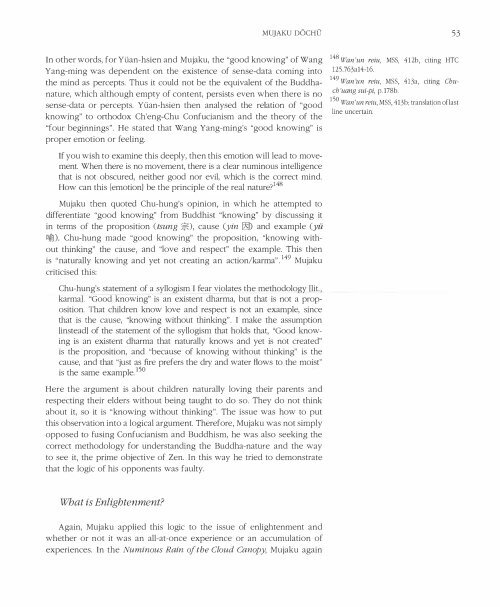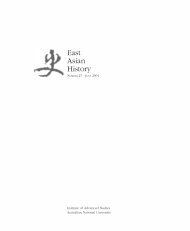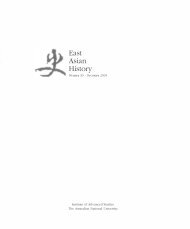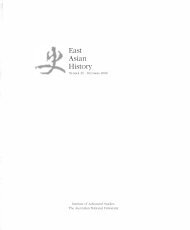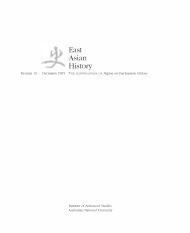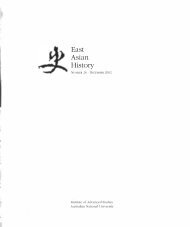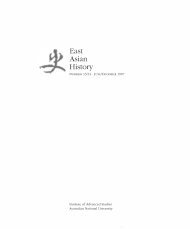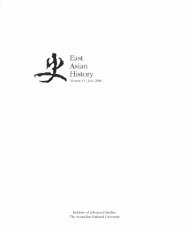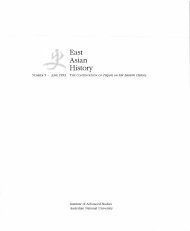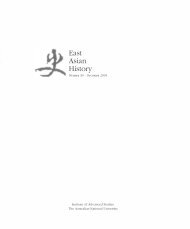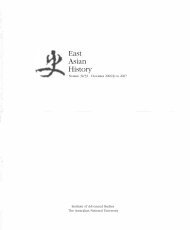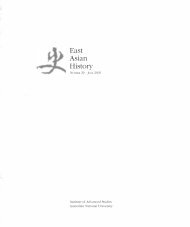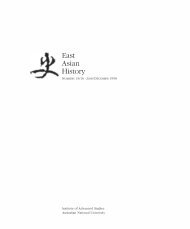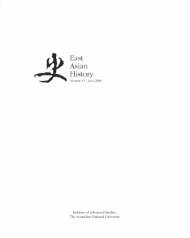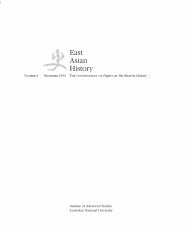Mujaku Dochu (1653-1744) and 17th-Century ... - East Asian History
Mujaku Dochu (1653-1744) and 17th-Century ... - East Asian History
Mujaku Dochu (1653-1744) and 17th-Century ... - East Asian History
Create successful ePaper yourself
Turn your PDF publications into a flip-book with our unique Google optimized e-Paper software.
MUJAKU DOCHO<br />
53<br />
In other words, for Yuan-hsien <strong>and</strong> <strong>Mujaku</strong>, the "good knowing" of Wang<br />
Yang-ming was dependent on the existence of sense-data coming into<br />
the mind as percepts. Thus it could not be the equivalent of the Buddhanature,<br />
which although empty of content, persists even when there is no<br />
sense-data or percepts. Yuan-hsien then analysed the relation of "good<br />
knowing" to orthodox Ch'eng-Chu Confucianism <strong>and</strong> the theory of the<br />
"four beginnings". He stated that Wang Yang-ming's "good knowing" is<br />
proper emotion or feeling.<br />
14 8 Wan 'un reiu, MSS, 412b, citing HTC<br />
125.763a14-16.<br />
149 Wan'un reiu, MSS, 413a, citing Ch u<br />
ch 'uang sui-pi, p.178b.<br />
150 Wa n 'un reiu, MSS, 413b; translation of last<br />
line uncertain.<br />
If you wish to examine this deeply, then this emotion will lead to movement.<br />
When there is no movement, there is a clear numinous intelligence<br />
that is not obscured, neither good nor evil, which is the correct mind.<br />
How can this [emotion] be the principle of the real nature? 1 48<br />
<strong>Mujaku</strong> then quoted Chu-hung's opinion, in which he attempted to<br />
differentiate "good knowing" from Buddhist "knowing" by discussing it<br />
in terms of the proposition (tsung *), cause (yin 12SI) <strong>and</strong> example (yu<br />
Iljfrj). Chu-hung made "good knowing" the proposition, "knowing without<br />
thinking" the cause, <strong>and</strong> "love <strong>and</strong> respect" the example. This then<br />
is "naturally knowing <strong>and</strong> yet not creating an action/karma" . 1 49 <strong>Mujaku</strong><br />
criticised this:<br />
Chu-hung's statement of a syllogism I fear violates the methodology [lit.,<br />
karmal. "Good knowing" is an existent dharma, but that is not a proposition.<br />
That children know love <strong>and</strong> respect is not an example, since<br />
that is the cause, "knowing without thinking". I make the assumption<br />
[instead] of the statement of the syllogism that holds that, "Good knowing<br />
is an existent dharma that naturally knows <strong>and</strong> yet is not created"<br />
is the proposition, <strong>and</strong> "because of knowing without thinking" is the<br />
cause, <strong>and</strong> that "just as fire prefers the dry <strong>and</strong> water flows to the moist"<br />
is the same example. ISO<br />
Here the argument is about children naturally lOVing their parents <strong>and</strong><br />
respecting their elders without being taught to do so. They do not think<br />
about it, so it is "knowing without thinking". The issue was how to put<br />
this observation into a logical argument. Therefore, <strong>Mujaku</strong> was not simply<br />
opposed to fUSing Confucianism <strong>and</strong> Buddhism, he was also seeking the<br />
correct methodology for underst<strong>and</strong>ing the Buddha-nature <strong>and</strong> the way<br />
to see it, the prime objective of Zen. In this way he tried to demonstrate<br />
that the logic of his opponents was faulty.<br />
What is Enlightenment?<br />
Again, <strong>Mujaku</strong> applied this logic to the issue of enlightenment <strong>and</strong><br />
whether or not it was an all-at-once experience or an accumulation of<br />
experiences. In the Numinous Rain of the Cloud Canopy, <strong>Mujaku</strong> again


